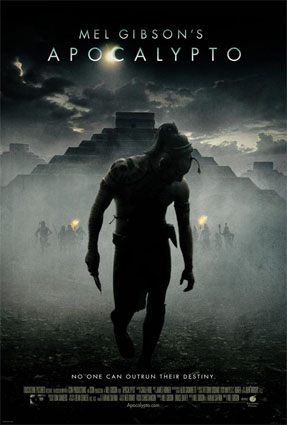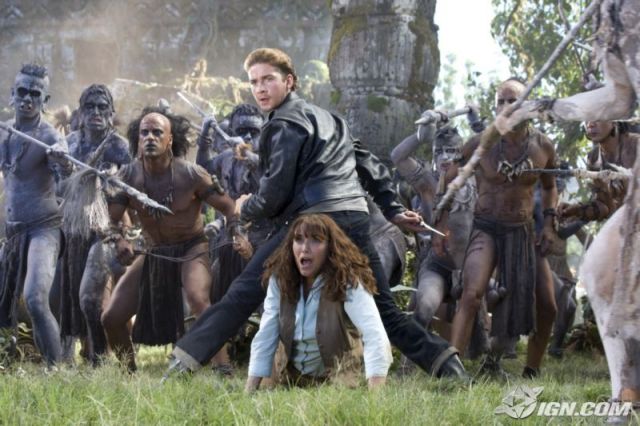What I'd like to hear from people in the industry is something like this:
Why? The studios said project B lost money for reasons 1, 2, and 3. Here are the numbers they gave me: xxx, xxx, xxx. Because of these numbers, the studios said, we won't fund your project A.
It has nothing to do with race, they explained, and everything to do with money. We'd greenlight your project in a second if we thought it could earn a profit. But Project B (as well as C, D, and E) proves that the audience for pictures like yours simply isn't there.
Well, I'm theorizing too. Someone was willing to fund The Missing, Windtalkers, Pirates of the Caribbean, Apocalypto, Kingdom of the Crystal Skulls, Bury My Heart at Wounded Knee, Comanche Moon, The Ruins, Aztec Rex, and so forth. Not coincidentally, these all had flawed or negative takes on Indians.
Of course, someone also was willing to fund more positive movies as long as they were set in the distant past. Hence The Last of the Mohicans, Dances with Wolves, Geronimo: An American Legend, Squanto: A Warrior's Tale, Pocahontas, The Emperor's New Groove, Spirit: Stallion of the Cimarron, Brother Bear, Hidalgo, and so forth.
So it's not true that Hollywood won't consider Native-theme movies. It simply won't consider Native-themed movies with a modern storyline. Hence no New Moon or Avatar until somebody forces the issue.
My conclusion: Hollywood's investors, studio execs, and distributors have a stereotypical view of Indians. These people think Indians lived primarily in the past, on the Plains, as primitive savages. If any Indians are left, these people think they're modern-day savages: bums, moochers, thieves, mobsters, or killers. I.e., people who would sell their mothers for a drink, a welfare check, or a pile of casino cash.
Needless to say, that view is racist.
If you don't think my view of Hollywood is correct, show me the hard data. For instance, low-budget comedies, romances, dramas, thrillers, or horror movies with no-name minority casts that failed to make money despite studio backing. Then I'll believe Hollywood is turning down pitches for similar Native movies for reasons other than racism.
For more on the subject, see Indians Hold Steady at 0.3% and Roscoe Pond or a Big-Name Actor?
Below: "Savage Indian killers? Sure, we'll spend a few hundred million dollars on that. No problem!"




5 comments:
Rob,
Jet here. Before understanding why there are so few "Native Themed" films I think you need to define what is a "Native Theme” and also the difference between Hollywood, independent films, micro budget movies etc...movies and films.
Apocalypto: That was a Mel Gibson film, not born out of Hollywood. Mel is rich he can make whatever films he wants. In fact, he was having a hard time finding a distributor at the completion of the film and many were saying it would go straight to DVD.
Dances with Wolves: Kevin Costner project. A star vehicle for him, a white actor, without a "star" and his team at the helm that film wouldn't have been made.
Avatar: Yes it is a story of an indigenous race, but I would argue 99% of the theater goers saw Aliens, not Indians in Avatar. Once again, a James Cameron project. That film wasn’t “pitched” as a Native themed film it was pitched as a “ground breaking visual effects 3-d sensation…and it delivered on that. Without Cameron at the helm, that film wouldn’t have been bankrolled. Titanic did him well.
If a “Native” director along with a “Native” producer made "The Godfather" would that make it a Native film? I don't think so.
Does a Native Themed film have to have a Native director, writer producer…by your list…no.
If an Indian is in a movie does that make it “Native themed?” That’s a pretty low standard.
Does the film have to center around a lead Native or Indigenous person dealing with the central plot of the film (and not a “Hollywood A-lister.”) ? I would say YES, that is a Native themed film
If we’re really lucky the story will avoid stereotypes, and even show Native Americans as a part of modern civilization…that’s one most of these films miss: they perpetuate the myth that Indians are an ancient culture lost to the ages. Whale rider is a good example of a great Native themed film in my mind. Contemporary, culturally inclusive, powerful characters and a coming-of-age story that appeals to all cultures.
What you think of as “Hollywood” is really just big companies held by bigger companies (G.E., SONY) to move products (films) made by production companies through a distribution cycle to capitalize as much as they can on the product for as long as they can.
Films are generally made by production companies…you know; the logos that appear AFTER the studio logos have been tacked on the front of the movie? They are the ones who “made” the film and have contracted with the studio for funding and distribution.
You’ll never get “hard data.”
Experiences, stories, yes, but hard data? Public disclosure in Hollywood business isn't a requirement.
(continued below)
The trouble with Native themed films starts at the script level (in Hollywood.)
EVERY working screenwriter, screenwriting blog, web site, guru, agent, manager, has a mantra for writers who want to “break into” the business of Hollywood screenwriting:
It includes: Write your lead part to attract an “A-list" actor.
That will stop most writers from trying to pitch a Native-themed film before they even begin to write it.
I’m not making this up, Google it for yourself.
Out of the 40,000 scripts submitted to the WGA each year, how many are “Native Themed?” How many are any good? How many get picked up by an agent, and of those how many actually get a chance to get pitched to a big production company?
That is a small percentage I’d say…next to none.
It is hard to get past the gatekeepers.
You keep saying that "A-listers" don't guarantee sales.
YOU ARE RIGHT.
A-listers guarantee marketability, besides the A-listers, (or their production companies to be precise) are the ones PRODUCING many of the films.
If there are no Native Americans (with studio first-look deals) or production companies writing/having scripts pitched to them, and Hollywood isn’t hiring writers to scribe Native themed films…where are these stories coming from?
There are web sites that track scripts within the industry, (http://blog.itsonthegrid.com/) and I can tell you I haven’t seen any Native themed films in the pipeline being sold, sent out or “pitched.”
Remember: None of this info matters for Indie, short or “art” films. That is a whole different ballgame, unless you are trying to get money up front from a distributor, then see: “How to market your indie film to distributors by attaching talent”
Check out the web site FilmSpecific.com. Members of that site have access to a list of actors that by attaching them will help get you foreign and domestic sales. The list is updated after every film market. There are no Native Americans on that list.
In response to your question about my pedigree:
How do you know my name isn’t “Jet”?
I haven’t seen you ask Dmarks about his nom-de guerre (maybe I missed it)
I’m a FILMmaker (emphasis on film.) I don’t make videos or “movies”.
I have been in the independent film business full time since 1998. I have produced, written, and directed a feature, several shorts, winning awards and seeing my film in theaters and festivals. And like most people in the business I am not a known Hollywood talent. :-)
I can be found on IMDB. (But so can a lot of people.)
I have worked on other peoples theatrically released films and work with Oscar and Emmy award winning talent on my own projects.
I have also taught advanced film production (script to screen) at a brick and mortar film school.
I was recently brought on to direct scenes for an upcoming feature length documentary.
I have written and direct theatrical productions and am invited to do so regularly.
For the past 5 years+ I have actively tried to produce a “Native Themed” film. Written with the help of “Native Americans,” consulted by “Native Americans,” casting “Native Americans” in lead roles with a story about non-historic “Native Americans” that even honors “Native American” veterans. (You published my “Trials of making a Native Film” letter so I’m being redundant.)
The first question I get asked is “How do you ever expect to produce a film about a thirteen-year-old Indian?
Don’t believe me? I’m good with that.
Keep the faith Rob, I love the blog and what you are doing.
Jet
Wow, Jet...I said some of the same things the other day, but not quite so eloquantly nor with so many words. And I have to say that I completely agree.
I follow Native American issues and love Rob's blog and all that he does, even though I disagree with some of his points at times.
Hollywood likes its demographics and will greenlight films that will (possibly) make the most money, appeal to the largest audience and for the most part, not take social issues into consideration.
Indie films have always been the heart of film making. Who cares about the name attached to the film if it touches, speaks, moves, educates and/or entertains. Isn't that the point?
And for the record, I enjoyed the 3-D visual effects of Avatar. Even enjoyed the story line. It would take an idiot to not realize where the story originated from if the audience member took one class in American History. Big effing Duh! But, as I have read in many reviews that the "white man" saved the indian, yet again, I beg to differ. Mother Nature saved the day. Before she intervened, the indigenous aliens were losing, getting their butts kicked, going down and every other cliche' that you can add. Sorry, went off on a tangent.
My main point was and will remain, "wow, Jet, that was very well put."
Collectively, majority of America and Western Society just will not acknowledge our existence outside of the past and/or the stereotypes we're portrayed in movies. This is a symptom of a deeper problem which involves Western Society's subconscious dream of the absolute genocide of the Native/1st Nations people of the Western Hemisphere.
Northern Exposure, in it's quirky early 90's tv series way, kind of gave a glimpse at modern Native life, but this in no way fit in with Western Society's collective perversion of romance about whom and what we are/were.
I am not in the "industry" and know little about the behind the scene politics, but I will say this...more of a discovery of a door that could be opened for exploration...Because of the work I do (a means to support my family, but not what is in my heart) I have spoken to writers and actors of a very popular television show about doing a native american themed story line one week, employing the right people for the parts. The response I received was that a story and script HAD been written for the show that involved natives and events taking place on a reservation. It was the central theme of that episode. But apparently, because this show is a namesake of a real existing agency, the Pentagon would not approve it, nor would the tribal leaders. Of course, having said that, I have NO idea what the story was, weather it was offensive, too sensitive for prime time or any other justification. But it sheds light on that the attempt to produce native themed stories by well intended writers ends up on the cutting room floor because of other politics as well. We can only speculate on the layers of process that go into the decision to cut a story.
Post a Comment